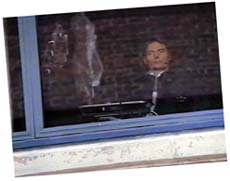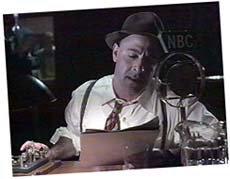Perfection in Jeopardy
A remake and a biopic fall short of their originals.
Rear Window
ABC; Sunday, Nov. 22, 9 p.m. ET
Winchell
HBO; click for regional air times.

Some people look for a mate to re-create a sick emotional dynamic from their childhood. Me, I look for a movie that can manipulate me as ruthlessly as Alfred Hitchcock's Rear Window. Remember when the sinister giant played by Raymond Burr finds Grace Kelly in his apartment, snooping around for evidence that he killed his wife? He grabs her and throttles her, then realizes that she's signaling through the window to someone on the other side of a courtyard. We know that the person being signaled is Jimmy Stewart, a photographer temporarily confined to a wheelchair and unable to defend himself. The moment when Burr raises his bulging peepers toward the helpless Stewart's window--in a kind of nonverbal announcement that "I will find you, and I will kill you"--must be one of the scarier scenes ever filmed.
Hitchcock's Rear Window is that rarest of items: a thing of depth and beauty built on gimmicks. The hero-in-a-wheelchair is a gimmick, and so is the Grace Kelly character. She didn't exist in the Cornell Woolrich story that inspired the film: Hitchcock invented her so we could marvel at her chiffon gowns and 20 inch waist, then suffer at seeing perfection in jeopardy.
So it seems only fair to approach the new TV remake of Rear Window, starring Christopher Reeve in his first acting role since The Accident, with an open mind. Yes, the casting exploits Reeve's suffering; Reeve even serves as executive producer, which suggests that he's in on the exploitation for some purpose of his own. But the Master of Suspense wouldn't have been above such a stunt. To know that the actor playing the paralyzed and breathing-impaired voyeur is paralyzed and breathing-impaired in real life, and to remember that this same actor once played a superhero who could make the planet spin--it should add up to effective manipulation, of a gossipy, contemporary variety.
Reeve's health has improved since his early post-accident TV appearances. He now speaks long sentences with relative ease, and if his breathing apparatus forces him to deliver lines in a weak monotone, at least it lends his acting a stamp of authentic vulnerability. The stunt casting works fine, especially in one genuinely horrifying scene in which the villain nicks Reeve's plastic windpipe, causing him to gulp for air like a fish on display in the streets of Chinatown. But everything else in this film lets you down. Reeve plays Jason Kemp, a workaholic architect who was almost killed in a car accident. After a long bout of therapy, he returns home to find his loft remodeled to accommodate his new challenged lifestyle. The early minutes of the film feature several bizarre, infomercialesque interludes touting the robotic technology now available to paraplegics; communicating this in-your-face optimism would appear to have been Reeve's purpose in making the film.
Worthy activism aside, the agenda here is pretty thin. In the Hitchcock original, Stewart peered through his window at a Runyonesque apartment building teeming with chorus girls and rootless salesmen and carping old biddies. There was a funny-sad truth to these characters, who were both lonely and packed in like sardines; Hitchcock slowly let us in on their lives, and the loving detail lent the gimmicky plot depth. The remake is set in a generic Yuppieville, someplace combining high-tech and big pine trees (Boulder? A trendy corner of the New South?). The building Reeve looks out on is home to lush furniture and glamorous oversize windows but not to any really distinctive characters, unless you count the goateed sculptor whom Reeve suspects of murder. As played with unnerving amphetamine frenzy by Ritchie Coster, he's a clichéd British baddie.
Then there's Darryl Hannah as Jason's co-worker Claudia, who helps investigate the murder and then falls in love with him. Hannah's part is underwritten, and she underacts it even further. To be fair, this may be Reeve's fault. In his determination to show the disabled in a positive light, he seems to have banished psychology from the set. The wheelchair-bound apparently are not allowed to have ambivalent thoughts or tense undercurrents in their relationships with other human beings. They are attractive, and attractive people want to marry them--simple as that. The film ends on another infomercial note, promising that, someday soon, Reeve won't just be walking--he'll also be having rousing sex. It's supposed to inspire hope, but I felt pity for Reeve and bewilderment that no one had read the script and called a doctor.
W inchell, the new HBO movie starring Stanley Tucci as the inventor of modern gossip, isn't as awkward as Rear Window, but it, too, is incompetent. Rear Window suffers from earnestness; Winchell suffers from over-sophistication--a reluctance to go over familiar ground, and the wrongheaded notion that we the audience are so saturated with tabloid sleaze that we already know everything there is to know about it. Paul Mazursky is an old hand at directing, but maybe he's been around too long. The film unfolds in an insider's shorthand; it's more a knowing parade of names than a story with characters to invest in.
Rather like a gossip column, in fact. After two hasty and utterly confusing scenes of Winchell's childhood (he gets kicked by a horse; he's standing on some kind of stage, apparently during World War I, talking about Huns), we meet him as an adult, already a gossip columnist, already at the top of his game. He writes flattering things about FDR, which makes William Randolph Hearst jumping mad and eventually pisses off Adolf Hitler, who declares him an enemy of the German state. He starts a radio show and, when he moves to another station, picks a young Ed Sullivan to replace him. After World War II he turns sour, befriending Joseph McCarthy and behaving insensitively toward Josephine Baker.

T ucci is a first-class actor, a Dustin Hoffman without the preening. His impersonation of Winchell's radio voice gets it just right: the gunfire speed, the shift into nasal high gear, the insertion of gratuitous "ee" sounds for emphasis, as in "reenovated" and Josef "Staleen." But the chronology in the film is out of whack. Key information is skipped over, and Tucci is too introverted an actor to whip the chaos into shape. To pick one out of dozens of examples: In the middle of the film, Winchell talks to someone in a hotel room. He's wearing a crisp, formal naval suit. Since he is in his 40s at this point, we have no clue why, and the confusion distracts us from what he's saying; only later on do we learn that he had a commission from FDR to go to Brazil (to do what, we're never sure).
What's ironic is that we're talking here about Walter Winchell, master manipulator, a man who knew as well as Hitchcock how to strike at the heart of a story. But Scott Abbott's high-concept screenplay is too abstract to do that. You get the sense that this project was greenlighted because tabloid journalism is a hot subject right now. Its producers would like to take a position on Matt Drudge and Monica mania but can't decide what position to take.
All this violates the fundamental rule of storytelling: Put your characters first and the audience will, too; don't, and we won't. Watching Winchell side by side with Rear Window made me perceive a business opportunity for the new millennium: an academy to teach the ancient discipline of popular entertainment. Classes could include "Elementary Logic" and "Plots Are Our Friends." And the core course, which everyone must take before graduating: "Who Is This Person, and Why Should We Care?"